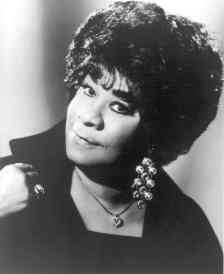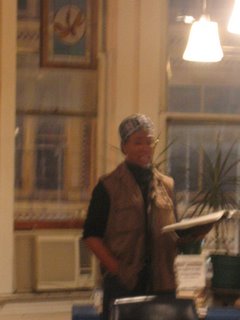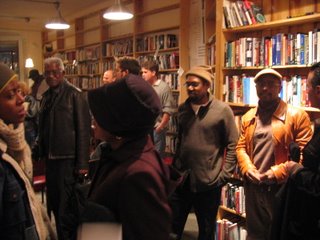It's come to this: reality bites--and bites the non-fact-based community hard. For political reasons, the President of the United States got publicly dissed by the puppet he pushed to install--for political reasons. Tonight's abruptly canceled "high stakes" summit between W Bush and Iraqi Prime Minister Nouri Al-Maliki, which the US mainstream media had begun to subserviently hype as they have so much of the Potemkin stagecraft and shadowplay for years with this charlatan, is the culminating embodiment of so much that's gone wrong since W was handed the office on a Supreme platter in 2000. Perhaps he is still unaware that a "civil war"--as even the abashed former Secretary of State General Colin Powell is now calling it--that W refuses to call a civil war rages not far from where he was publicly humiliated; that Iran is considerably stronger than it was in 2003 before the war, as is Syria; and that his advisors and generals increasingly are calling his folly just that, a folly. Put another way, it's over. Over, and more than the mainstream US media were watching. Author Ron Suskind, like so many others (John DiIulio, Paul O'Neill, Richard Clarke, etc.) noted that from the get-go W Ltd. disdained the reality-based community, an assertion proved so many times it became the norm and then a truism, but even W, in his haze or daze, take your pick, must have understood tonight's snub for what it really was. The zombies* can continue to deny that people are being executed gangster-style or set on fire in public squares, that Iraqis' futures look so bleak many no longer can envision a viable future, and that a nationalist cleric who made clear his hatred of the US early on is now calling the shots. But they won't be able to deny that this president, who so arrogantly arrogated himself to the stature of Churchill, Lincoln and others, received a slap across the face harder and more insulting than his party's loss of Congressional power just a few weeks ago. The corporate-synchronized US media will do their best to salvage whatever dignity may remain for him, to help him salvage face (since it's beyond saving, like Iraq), but across the rest of the world, if there were any doubts about how disastrous he's been, they've been dispelled forever.
*The Truth About Bushophiles
Straight from Tom Tomorrow via DailyKos comes a brief report from the New Haven Advocate on a study by Christopher Lohse, a Southern Connecticut State University masters student in social work: there is "a direct link between mental illness and support for President Bush." I can't vouch for the accuracy of the claims in it, but I had to post it nevertheless. Says the report:
Lohse says his study is no joke. The thesis draws on a survey of 69 psychiatric outpatients in three Connecticut locations during the 2004 presidential election. Lohse’s study, backed by SCSU Psychology professor Jaak Rakfeldt and statistician Misty Ginacola, found a correlation between the severity of a person’s psychosis and their preferences for president: The more psychotic the voter, the more likely they were to vote for Bush. [...]
“Our study shows that psychotic patients prefer an authoritative leader,” Lohse says. “If your world is very mixed up, there’s something very comforting about someone telling you, ‘This is how it’s going to be.’”
The study was an advocacy project of sorts, designed to register mentally ill voters and encourage them to go to the polls, Lohse explains. The Bush trend was revealed later on.
Not that this wasn't apparent all along....
JengoTV
Bernie passed along an email press release for JengoTV, a new online resource and video site for LGBT people of color. Jengo describes itself like this:
JengoTV emerged from the overwhelming response and popularity of Inside Blast, an LGBT of color news and entertainment show created in February 2006.
Jengo means "building strength'' in Swahili. JengoTV is the premiere online media network for the LGBT community of color. Founded in September 2006, the goal of JengoTV is to provide original content by, for and about the LGBT community of color and gay-friendly supporters. Our site is filled with a variety of groundbreaking and acclaimed gay, lesbian films and music videos. Inside Blast is an original talk show on JengoTV and features many gay-friendly celebrities and music artists.
Everyday JengoTV is building new partnerships many of which include filmmakers from around the country, various online social networks and portals, businesses and organizations who support the gay community.
Right now there's not a lot on it, except a few trailers and promo videos (including one featuring Nick Cannon), several interviews (including ones with authors Marvin K. White and Clarence Nero and publisher Lisa Moore), and the beginnings of a bulletin board, blog, and podcast and videocast library, but it has the potential to develop into a great community-driven forum. (The initial video ads are extremely annoying!) I'm bookmarking it and will be checking it regularly to see what's up. Perhaps some J's Theater readers will be contributing to it soon.
The Value(s) of Abstraction
 The late J. Kirk T. Varnedoe, for many years chief curator of painting and sculpture at the Museum of Modern Art, and later a professor at the Institute of Advanced Study in Princeton, delivered a series of lectures at the very end of his life that have been collected in the volume Pictures of Nothing: Abstract Art Since Pollock (Princeton University Press). The current issue of the Chronicle of Higher Education features an adaptation of one of the pieces, entitled "The Shared Culture of Private Visions." It's a little essay that functions as a defense of abstract art, yet adopts an at-times unusual argument that differs from the criticism of art historians and critics such as Arthur Danto, Briony Fer, Yve-Alain Bois, Rosalind Krauss, Franklin Sirmans, and so on. I'll quote the final paragraph below, but I do want to note that in place of the original image that accompanies the article, a painting by Cy Twombly, I've posted an image of a screen painting by Joe Overstreet, which emblematizes some of the ideas in the piece as fully as the Twombly. And now, to quote Varnedoe:
The late J. Kirk T. Varnedoe, for many years chief curator of painting and sculpture at the Museum of Modern Art, and later a professor at the Institute of Advanced Study in Princeton, delivered a series of lectures at the very end of his life that have been collected in the volume Pictures of Nothing: Abstract Art Since Pollock (Princeton University Press). The current issue of the Chronicle of Higher Education features an adaptation of one of the pieces, entitled "The Shared Culture of Private Visions." It's a little essay that functions as a defense of abstract art, yet adopts an at-times unusual argument that differs from the criticism of art historians and critics such as Arthur Danto, Briony Fer, Yve-Alain Bois, Rosalind Krauss, Franklin Sirmans, and so on. I'll quote the final paragraph below, but I do want to note that in place of the original image that accompanies the article, a painting by Cy Twombly, I've posted an image of a screen painting by Joe Overstreet, which emblematizes some of the ideas in the piece as fully as the Twombly. And now, to quote Varnedoe:Abstraction has been less a search for the ultimately meaningful ... than a recurrent push for the temporarily meaningless: that is, things that are found not often in exotic realms but rather on the edges of banality, familiarity, and the man-made world. It is the production of forms of order that are not recognizable as order, but vehicles of feeling that appear utterly dumb. Abstract art is a symbolic game, and it is akin to all human games: You have to get into it, risk and all, and this takes a certain act of faith. But what kind of faith? Not faith in absolutes, not a religious kind of faith. A faith in possibility, a faith not that we will know something finally, but a faith in not knowing, a faith in our ignorance, a faith in our being confounded and dumbfounded, a faith fertile with possible meaning and growth.


 A while ago I wrote about the remarkable
A while ago I wrote about the remarkable  Writer
Writer  "The post-human in things in general, then, is that which proposes an entity with which only the human could interact as an other, and which--neither a decorated thing nor personifiable mechanism, although we may long for it to be so--is at once a being and nonorganic. The relationship between the outside and the inside of such entities is one between a blank surface and an interior which is not mechanical but is rather an affair of the electrical and the simultaneous and the near-simultaneous, more like a brain than an articulated body, and in a general way Bergsonian in its capacity to make connection through what is already present to a memory. It would in that be the place of two sorts of multiplicity. One, that of pure ratio, is what Deleuze calls the 'multiplicity of exteriority, of simultaneity, of juxtaposition, of order, of quantitative differentiation, of
"The post-human in things in general, then, is that which proposes an entity with which only the human could interact as an other, and which--neither a decorated thing nor personifiable mechanism, although we may long for it to be so--is at once a being and nonorganic. The relationship between the outside and the inside of such entities is one between a blank surface and an interior which is not mechanical but is rather an affair of the electrical and the simultaneous and the near-simultaneous, more like a brain than an articulated body, and in a general way Bergsonian in its capacity to make connection through what is already present to a memory. It would in that be the place of two sorts of multiplicity. One, that of pure ratio, is what Deleuze calls the 'multiplicity of exteriority, of simultaneity, of juxtaposition, of order, of quantitative differentiation, of  According to
According to  Vivacious, earthy
Vivacious, earthy  Artist
Artist 










